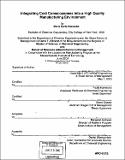Integrating cost consequences into a high quality manufacturing environment
Author(s)
Eustache, Marie Carla, 1970-
DownloadFull printable version (3.190Mb)
Other Contributors
Leaders for Manufacturing Program.
Advisor
Paula Hammond and Steve Graves.
Terms of use
Metadata
Show full item recordAbstract
Intel Corporation, the world leader in manufacturing microprocessors, has beer successful in achieving high margins because of its ability to successfully deliver high volume and reliable microprocessors at high demand. By ensuring the reliability and quality of the same product at multiple sites, Intel coordinated knowledge sharing across multiple facilities through a virtual factory, an approach known as "Copy Exactly". "Copy Exactly" methodology is a dominant force and integral part of Intel's culture in achieving high quality and high volume manufacturing. However, as the demand for microprocessors dropped in recent years, Intel focused more on lowering cost for higher margin earnings. Although lowering cost has been a normal process within Intel's operating environment, cost reductions usually occurred upfront during the product development period or the latter part of the manufacturing product life cycle. Between those stages, quality and output improvements were the primary focus. Cost reductions projects in manufacturing were delayed until sustainability stage. Intel initiated a paradigm shift on managing cost in manufacturing by pushing cost reduction projects earlier in the manufacturing product life cycle and moving accountability to groups that impact cost directly. The challenge of implementing this strategy posed is the focus of this thesis. The LFM (Leaders for Manufacturing) internship at one of Intel's fabrication plant was developed to initiate and implement the commodity cost reduction program during production ramp. This thesis analyzes the challenges that Intel's manufacturing organization faces, while implementing a radical change in reducing commodity cost. By exploring the details of Intel's current organizational culture, technical strategy, and core competencies, the thesis describes how these factors affect the implementation and execution of the cost reduction program. By means of the concepts of reengineering as described by Michael Hammer, the cost reduction strategy will be analyzed for effectiveness. This program led the organization to focus on cost consciousness, while maintaining the high quality and reliability Intel is known for.
Description
Thesis (S.M.)--Massachusetts Institute of Technology, Dept. of Chemical Engineering; and, (M.B.A.)--Massachusetts Institute of Technology, Sloan School of Management; in conjunction with the Leaders for Manufacturing Program at MIT, 2003. Includes bibliographical references (p. 61).
Date issued
2003Department
Leaders for Manufacturing Program at MIT; Massachusetts Institute of Technology. Department of Chemical Engineering; Sloan School of ManagementPublisher
Massachusetts Institute of Technology
Keywords
Chemical Engineering., Sloan School of Management., Leaders for Manufacturing Program.